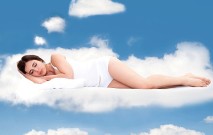HOW MUCH SLEEP DO YOU REALLY NEED?
Have we been misled all these years being told that we need eight hours of sleep? Don’t you feel a little more alert and cognitive after getting seven hours of sleep? And don’t you feel somewhat groggy the next day if you’ve had nine hours or more sleep?
Sleep scientists say that skimping on a “full night’s sleep”, even by 20 minutes, impairs an adult’s performance and memory the next day. And getting too much sleep—not just too little of it—is associated with health problems including diabetes, obesity and cardiovascular disease and with higher rates of death, studies show. Getting the right amount of sleep is important in being alert the next day, and several recent studies have found an association between getting seven hours of sleep and optimal cognitive performance.
If we reach the ripe old age of 100 years we will have spent one third of our life, or a total of 584,000 hours* sleeping. If you are 50 years old you would have on average been asleep for 16 years and 4 months*. Rip van Winkle did it all in one stretch but have you matched his feat? ( *Excluding the additional days in leap years)
Do you want to get back some of that lost time? You can! Evidence-based studies of large samples show that, for an adult, the optimum sleep time is 7.2 hours. Your personal make-up may make you an exception but for most people 7.2 hours of healthy sleep will be the right amount.
Research Revelations
“The lowest mortality and morbidity is with seven hours,” said Shawn Youngstedt, a professor in the College of Nursing and Health Innovation at Arizona State University Phoenix. “Eight hours or more has consistently been shown to be hazardous,” says Dr. Youngstedt, who researches the effects of oversleeping.
Daniel F. Kripke, an emeritus professor of psychiatry at the University of California San Diego, tracked over a six-year period data on 1.1 million people who participated in a large cancer study. People who reported they slept 6.5 to 7.4 hours had a lower mortality rate than those with shorter or longer sleep. The study, published in the Archives of General Psychiatry in 2002, controlled for 32 health factors, including medications.
In another study, published in the journal Sleep Medicine in 2011, Dr. Kripke found further evidence that the optimal amount of sleep might be less than the traditional eight hours. The researchers recorded the sleep activity of about 450 elderly women using devices on their wrist for a week. Some 10 years later the researchers found that those who slept fewer than five hours or more than 6.5 hours had a higher mortality.
A study in the journal Frontiers in Human Neuroscience last year used data from users of the cognitive-training web site Lumosity. Researchers looked at the self-reported sleeping habits of about 160,000 users who took spatial-memory and matching tests and about 127,000 users who took an arithmetic test. They found that cognitive performance increased as people got more sleep, reaching a peak at seven hours before starting to decline.
After seven hours, “increasing sleep was not any more beneficial,” said Murali Doraiswamy, a professor of psychiatry at Duke University Medical Center in Durham, N.C., who co-authored the study with scientists from Lumos Labs Inc., which owns Lumosity. He said the study replicated earlier research, including a look at memory loss. “If you think about all the causes of memory loss, sleep is probably one of the most easily modifiable factors,” he said.
A study in the current issue of Journal of Clinical Sleep Medicine seemed to confirm that “you can’t overdose on healthy sleep. When you get enough sleep your body will wake you up”. Five healthy adults were placed in what the researchers called Stone Age-like conditions in Germany for more than two months—without electricity, clocks or running water. Participants fell asleep about two hours earlier and got on average 1.5 hours more sleep than was estimated in their normal lives, the study said.
Their average amount of sleep per night: 7.2 hours.
Conclusions
Experts say people should be able to figure out their optimal amount of sleep in a trial of three days to a week, ideally while on vacation. Don’t use an alarm clock. Go to sleep when you get tired. Avoid too much caffeine or alcohol. And stay off electronic devices a couple of hours before going to bed. During the trial, track your sleep with a diary or a device that records your actual sleep time. If you feel refreshed and awake during the day, you’ve probably discovered your optimal sleep time. You may need less sleep than you thought.













